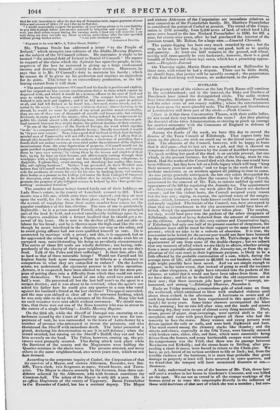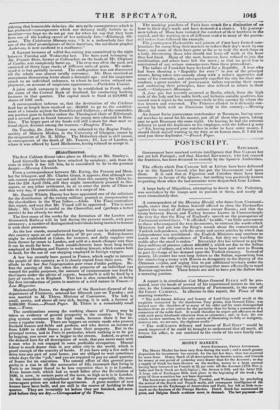SCOTLAND.
The greater tart of the visiters at the late Perth Races still continue in the neighbourhood; and in the interval, the Duke and Duchess of Buceleuch have joined the distinguished circle. The noble visiters have been alternately guests at Scone, Dupplin, Kinfauns, Freeland, and the other seats of our county nobility ; where the entertainments have been upon the most splendid scale. The Marquis and Marchioness of Londonderry still form part of the circle.—Perth Courier.
[ [low is it that these Conservative Thanes, with their noble ladies, do not wend their way homewards after the races ? Are they plotting the downfall of the Grey Administration, or striving to pluck up courage for another encounter with the Commons of England in defence of their antiquated politics ?] Among the deaths of the week, we have this day to record the demise of the Town Council of Edinburgh. That august body has given up the ghost,—we wish we could say in the literal sense, paid the debt. Tine admirers of the Council, however, will be happy to learn that it died game—that its last act was a job, and that it showed no symptoms at that weakness known by the name of deathbed repentance. To speak nothing but good of the dead, is an amiable precept, but one which, in the present instance, for the sake of the living, must be violated. Had the works of the Council died with them, the case would have been different ; but they have left us a little legacy which will long "keep their memory green in our souls," and we hope in the souls of their immediate successors, as an antidote against all jobbing in time to come. As was pretty generally anticipated, the late city rulers disregarded the
n petitio of tine
e inhabitants to allow the vacancy n the College Church; occasioned liv the removal of Mr. Tait, to remain unfilled up until the appearance of the bill for regulating the Annuity-tax. The appointment of a clergyman took place in one week after the Church was declared vacant ; noel for this ‘iolent baste, the Council assigned every reason but the true one ; urging, in excuse, the spiritual wants of the congregation—which, however, every body knows could have been most easily and amply supplied. Thefriends of the Council, too, have attempted to show that no retrenchment in the city assessment could have been cf. fected, though the appointment had never taken place.. The surplus, say they, would have gone into the pockets of the other clergymen of Edinburgh, instead of being deducted from the amount of assessment on the citizens. According to this very curious and Conservative logics if Edinburgh bad only one-half of its present number of clergymen, the inhabitants must still be taxed for their support to the same extent as at present ; which we take to be a reductio ad absurdum. It is true, the assessment to be levied for the currentnearwould net have been lessened by the non-appointment of a clergyman to Mr. Tait's charge, nor by the appointment of one from some of the double charges.;; but we submit that any measure of relief which we are likely to obtain, whether arising from a more equitable adjustment of the Annuity-tax,.or from the application of the seat. rents to their legitimate purpose, is likely to be a little affected by the probable continuation of a sum, which, during the average term of life, will amount to 20,000/. to ous burdens, when that trijle might possibly have been saved. And we are simple enough to suppose, in the latter event, that instead of going to swell the incomes of the other clergymen, it might have returned into the pockets of the citizens, or rather that it would not have been taken from them. But we have done ; and let us be thankful that the old corporations are at their rest ; that these incarnate jobs have gone down "unwept, unhonoured, and unsung."—Edinburgh Observer, November .5.
Early on Friday morning, a tremendous gale of wind came on from the westward, which continued to blow with unabated violence until about three o'clock in the afternoon. A hurricane so severe and of such long duration has not been experienced in this quarter (Edinburgh) for many years. Some bitter showers accompanied the blast in the morning ; but no rain fell after nine, and the roads and streets becoming dry, they were swept of almost every thing moveable. Dust, straw, pieces of paper, shop-sweepings, were carried aloft in the atmosphere, and came with great force against all those who had the temerity to face the storm. Many women and young persons were driven against the rails or walls, and were both frightened and hurt. The wind roared among the chimney stacks like thunder' and the streets and closes, especially in the Old Town, were literally strewed with broken cans, slates, tiles, and lime, which were eonstantiv being driven from the houses, and many hairbreadth escapes were witnessed. So tempestuous was the Frith, that there was no passage between Newhaven and Kirkaldy; and the steam-boats to Stirling, after proceeding a short di,tance, were forced to return to the Chain-pier. We have, as yet, beard of no serious accident to life or limb ; but, from the terrible violence of the hurricane, it is more than probable that great damage to property at least will have occurred in some quarters, and we dread that the tempest will have occasioned disasters at sea.— Scotsman.
A lady, understood to be one of the hearers of Mr. Tait, threw herself over a window in her house in Gardener's Crescent, and was killed on the spot. We are not so versed in all the strange workings of the human mind as to trace this catastrophe directly to the influence of those wild doctrines of that eect of which she was a member ; but con
sideringthat lamentable delusion, the miserable consequences which it has produced—consequences which our delicacy really forbids us to mention—we hope we do not go too far when we say that they have been one of the leading causes of her untimely fate.—Edinburgh Observer. The Caledonifot Mercury says, "It is a melancholy fact that one of the chief promulgators of these doctrines, the soi-disant prophet Anderson, is now confined in a madhouse."
A flagrant instance of wilful file-raising was committed in the night between Tuesday and Wednesday last. The barn-yard belonging to Mr. Francis Dens, farmer at Culteuchar, on the lands of Mr. Oliphant of Condie, was completely burnt up. The crop was all in the yard, and consisted of thirty large stacks of different sorts of grain. We understand it is but partially insured. The conflagration was not discovered till the whole was almost totally consumed. Mr. Dens received an anonymous threatening letter about a fortnight ago : and his suspicions attach to an individual unknown, to whom he had twice refused employment, on account of suspicious appearances.--Perthshire C'ourier.
A joint stock company is about to be established in Perth, under the name of the Central Bank of Scotland, for conducting banking business in that quarter. The capital stock is fixed at 250,000/. in shares of 100/. each.
A correspondent informs us, that the destination of the Crichton fund has at length been resolved On: 30,000/. to go to the establishment of a lunatic asylum for Dumfries and Galjoway ; of the remainder, one portion goes to further endow the Theological chair of Edinburgh, and a second goes to found bursaries for young men educated in Dumfries. The larger part of the funds will still remain for their most rational object, division among the trustees.—Duatfries Times.
On Tuesday, Dr. John Couper was inducted to the Regius Profes. sorship of Materia Medico, in the University of Glasgow, vacant by the resignation of Dr. R. Millar. The Midwifery chair is still vacant, in consequence of the death of Mr. Towers ; Dr. Lee of London, to whom it was offered by Lord Melbourne, having refused to accept it.





















 Previous page
Previous page